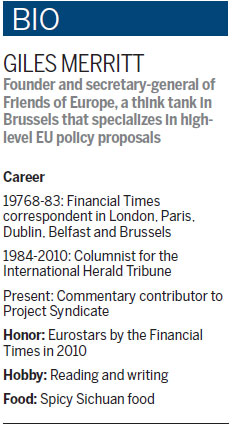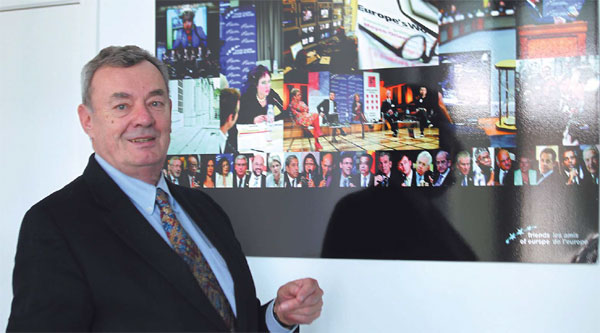Changing gears in a globalized world

Senior commentator says china and Europe must deal with social inequality, which is a universal issue
Giles Merritt, secretary-general of Friends of Europe, a Brussels-based think tank, says Europeans must face up to the challenge of growing social inequality and global changes brought about by emerging economies such as China during previous decades.
Merritt, a veteran journalist turned thinker and commentator, urges Europeans to recognize these changes and compete with China in moving up the value chain, hunting for talent and increasing labor market flexibility.
| Giles Merritt, secretary-general of Friends of Europe, says China is demonstrating how important education has become to sustain a healthy economy. Fu Jing / China Daily |
He says China's economic new normal, which is about adjusting the pace of growth and restructuring its economy, means there is a shift to a knowledge-based economy. China knows it needs to change gears.
"But I don't think Europe knows it needs to change gears," says Merritt.
"I think Europe has a real adjustment problem to the 21st century."
From 1968-83 he was a staff correspondent of the Financial Times and reported from London, Paris, Belfast, Dublin and Brussels. Since 1984 he has been writing on European Union matters for the opinion pages of the International Herald Tribune and other newspapers, his articles covering a range of political and economic issues.
Merritt is also the founder and secretary general of Friends of Europe. He launched Europe's World, the only Europe-wide policy journal, in 2005 as a European counterpart to the US periodical Foreign Affairs. Europe's World is published in partnership with a coalition of more than 100 think tanks and universities worldwide, and now has more than 100,000 readers in 171 countries.
According to Merritt, Europeans fail to grasp changes in the privilege and position they have enjoyed in previous centuries. Europeans have to change and should not pretend that there is no change in the world, he says.
"If China is moving up the value chain and the education chain, then Europe has to do the same if it wants to maintain its place in the world. But I don't think Europeans really understand that," he says.
Merritt says in the last 25 years, China has seen a period of rapid economic expansion based on the manufacturing of consumer goods.
"The impact was very quick but now China can't really pursue that policy any longer for a number of reasons," he says.
"First, technology is eliminating the low wage advantage. Second, the market for cheap consumer goods is shrinking, so these items are moving out of the value chain.
"So what's going to happen? Education and training, we can already see in China, are gaining much more importance than 50 or 20 years ago," he says.

"Now it is high-tech training for scientists, engineers and so on. That is going to permit China to start economic growth based on consumer spending. The Chinese need to boost their own consumer spending instead of relying on huge exports," he says.
Merritt says it is going to happen at a slower pace than the manufacturing revolution. "So it seems to me not a bad thing, but it is probably going to be politically difficult to slow down people's expectations to tell them it is not you but your children who can benefit," he says.
As for China's future, Merritt says he was looking at an opinion poll, in which 75 or 80 percent of Chinese thought tomorrow was going to be better than today, and today better than yesterday.
"They think in the future that their children will enjoy much greater material benefits," he says.
"The only weakness it seems to me is the social fabric. For families in rural China, the families' relationship and the family structure is very important and very strong. The question in my mind is that now young people are leaving villages, so what is going to happen with their families?"
Merritt says that Europe, for the past 100 years, has had greater equality than anywhere else in the world and that the European Union was built on the concept of equality. But it is essential to balance the problem of growing inequalities against the bigger picture of social equality in Europe. Some countries in Northern Europe, especially Scandinavian countries, have been very socially progressive for a long time, and European politics demand equal policies.
"But the economic crisis, since 2008, has had a very bad effect on European society, especially young people," says Merritt. "We can see young people find it hard to get a job, and they have lower salaries than previous generations."
Statistics have shown high levels of joblessness in Southern Europe among young people, although Merritt does not believe all the numbers. "The point is European youth unemployment is serious, not so dramatic as some people say, but still very worrying," he says.
Pointing at youths protesting outside his office on the day of the interview, Merritt shakes his head. "My message to young people is clear: Go back to school. That's sensible."
Merritt also says Europe must relax its immigration policy to attract more people.
"In my opinion, we need to import 100 million people in the coming years," he says. Currently the 28 member states of the EU have 500 million residents.
"What is Europe going to be? It's to bring in more low-skilled immigrants to do services, drive the buses, clean the garages and so on. Then you are going to have a new class, a new underclass. And we already have inequality problems."
He admits immigrants are not treated equally when they arrive, but the situation may be improved after one generation.
Many Chinese are investing in European properties, which Merritt believes is an interesting trend. "Though many of them have language communication problems, the children of those Chinese will be integrated into the global economy," he says.
According to Merritt, the income gap between the top 10 percent in Europe and the bottom 10 percent has widened dramatically since 2008. The top tier of society earning nine times what the bottom tier is earning.
China has replaced Germany as the country with more super millionaires and billionaires, so now the US, Japan and China have more millionaires than anybody else.
Merritt cites the 2012 figure for global wealth, which was $241 trillion (217 trillion euros), and by 2020, it will grow by 40 percent. About 85 percent of that growth will be in Asia and probably most of this growth will happen in China.
Because the trend of growing inequality is a global phenomenon, China has also got to contend with this challenge.
"China is also facing the income gap. That's a hard issue waiting for China," says Merritt.
Liu Jia contributed to this story.
fujing@chinadaily.com.cn
(China Daily European Weekly 05/22/2015 page32)
Today's Top News
- Japan tempting fate if it interferes in the situation of Taiwan Strait
- Stable trade ties benefit China, US
- Experts advocate increasing scope of BRI to include soft power sectors
- New engine powers cargo drone expansion
- China to boost green industry cooperation
- Manufacturing PMI rises in November































